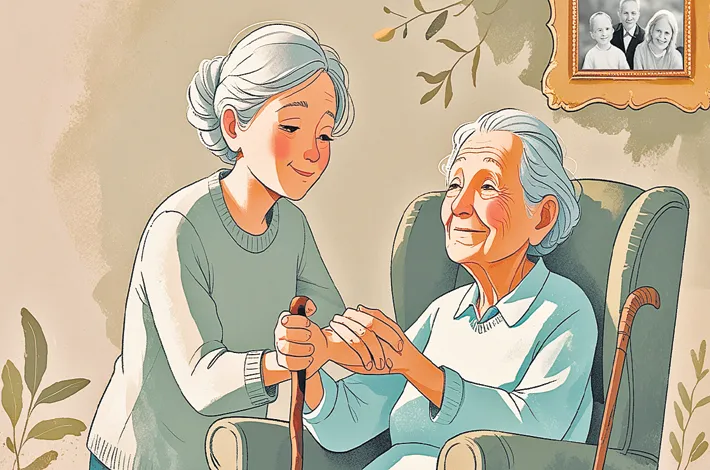The imperative of caring for aging parents
02-05-2025 12:00:00 AM

As life expectancy increases and medical advancements allow people to live longer, the responsibility of caring for aging parents has become a pressing concern for many. Parents, who once nurtured and guided us through life’s challenges, often reach a stage where they require support, compassion, and care.
Taking care of parents in their advanced age is not just a moral obligation but a profound opportunity to honor their legacy, strengthen family bonds, and contribute to their well-being. This responsibility, while demanding, is a meaningful way to reciprocate the love and sacrifices they made for us.
The Emotional and Moral Case for Care
Caring for aging parents is deeply rooted in the principles of gratitude and reciprocity. Throughout our lives, parents provide unwavering support—emotionally, financially, and physically. They shape our values, offer guidance, and often put their own needs aside to ensure our well-being.
As they age and face physical or cognitive decline, it becomes our turn to step into the role of caregiver. This act of care is a way to express gratitude for their lifelong devotion and to ensure they live their later years with dignity and comfort.
Beyond gratitude, there is a moral imperative to care for aging parents. Many cultures and religions emphasize the importance of honoring and respecting elders. For instance, in Confucian philosophy, filial piety is a cornerstone of ethical living, urging individuals to care for their parents as a fundamental duty.
Similarly, religious texts like the Bible and the Quran advocate for kindness and support toward parents, particularly in their old age. These values remind us that caring for our parents is not just a personal choice but a societal and ethical expectation that strengthens the fabric of families and communities.
The Challenges of Aging
Advanced age often brings a host of challenges, including physical ailments, cognitive decline, and emotional vulnerabilities. Conditions such as arthritis, heart disease, dementia, or mobility issues can make daily tasks difficult or impossible without assistance. Loneliness and isolation are also common among the elderly, especially if they lose a spouse, friends, or their sense of independence. These challenges can lead to depression or a diminished quality of life if not addressed with care and attention.
For many aging parents, the loss of autonomy is one of the most difficult aspects of growing older. Tasks they once performed with ease—cooking, driving, or managing finances—may become overwhelming. This is where adult children can make a significant difference by providing practical support, whether through helping with household chores, arranging medical care, or simply spending quality time together. By addressing these challenges, we help our parents maintain their dignity and sense of self-worth.
Practical Ways to Provide Care
Caring for aging parents requires a thoughtful approach that balances their needs with our own responsibilities. One of the first steps is to assess their physical, emotional, and financial needs. Open communication is key—discussing their preferences for living arrangements, medical care, and daily routines ensures that their wishes are respected. Some parents may prefer to remain in their own homes, while others may benefit from assisted living facilities or moving in with family.
Practical support can take many forms. Helping with grocery shopping, accompanying them to doctor’s appointments, or managing medications can significantly ease their burdens. For those with mobility issues, installing safety features like grab bars or ramps can enhance their independence. Financial planning is another critical area, as many elderly individuals face rising healthcare costs or limited income. Adult children can assist by helping them navigate insurance, pensions, or government benefits.
Emotional support is equally important. Aging parents often crave connection and reassurance. Regular visits, phone calls, or shared activities like watching a favorite movie or gardening can lift their spirits. For those living far away, technology offers solutions like video calls or smart devices to stay connected. Listening to their stories, validating their feelings, and involving them in family decisions can help combat loneliness and foster a sense of belonging.
Balancing Care with Personal Responsibilities
Caring for aging parents can be emotionally and physically taxing, especially for those juggling careers, raising children, or managing their own health. The “sandwich generation,” caught between caring for both parents and children, often faces significant stress. To avoid burnout, it’s essential to set boundaries, seek support, and practice self-care. Sharing responsibilities with siblings or other family members can lighten the load, as can hiring professional caregivers when needed.
Community resources, such as adult day care, meal delivery services, or support groups, can also provide relief. In some cases, government programs or nonprofit organizations offer financial or respite care assistance. By leveraging these resources, caregivers can ensure their parents receive quality care without sacrificing their own well-being.
The Rewards of Caregiving
While caring for aging parents can be challenging, it is also profoundly rewarding. The act of caregiving deepens family bonds and creates lasting memories. It offers a chance to learn from their wisdom, share moments of joy, and give back in a meaningful way. For many, the experience fosters personal growth, teaching patience, empathy, and resilience.
Moreover, caring for aging parents sets a powerful example for future generations. Children who witness their parents’ dedication to their grandparents are more likely to value family, respect elders, and carry forward these traditions. This cycle of care strengthens not only individual families but society as a whole.
Conclusion
Taking care of parents in their advanced age is a responsibility that carries immense moral, emotional, and practical weight. It is an opportunity to honor their legacy, support them through the challenges of aging, and ensure they live with dignity and love.
While the journey may be demanding, the rewards—strengthened family ties, personal growth, and the satisfaction of giving back—are immeasurable. As we navigate this role, let us approach it with compassion, patience, and gratitude, recognizing that caring for our aging parents is one of life’s most meaningful acts.








